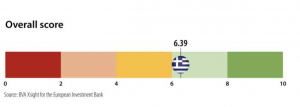
Greeks are very much aware of the impact of climate change but still have a long way to go to identify possible solutions, the European Investment Bank (EIB) Climate Survey reveals this week.
More specifically, according to the survey conducted on more than 30,000 participants in 35 countries, including the UK, the US, Japan, Canada, and EU states, Greeks appear to have a solid understanding of the causes and consequences of climate change but lack knowledge about effective solutions.
Overall, Greek respondents came close to the EU average (6.37) in terms of understanding the causes and effects of climate change with a score of 6.39 out of 10. Leading the way were respondents in Finland with a score of 7.22, Luxembourg (7.19), and Sweden (6.96).

Key takeaways of the EIB study include:
- 87% of Greeks are aware of the negative impact of climate change on human health
- 88% said climate change is worsening world hunger by affecting crop yields due to extreme weather
- 72% of Greeks said that the global sea level is rising
- 74% said climate change is affecting migration patterns.

However, when it came to knowledge about combating climate change Greeks scored 4.08 out of 10 below the EU average of 4.25. While 78% were informed about the benefits of using recyclable products and 70% understood the importance of using public transport, only 43% were aware that better insulating buildings can help. Additionally, only 28% were aware that buying new clothes less frequently could also ease climate change and 20% that reducing the speed limit on roads would help.

Referring to the importance of addressing knowledge gaps, EIB Vice-President Ioannis Tsakiris highlighted the EIB’s role in financing climate initiatives and promoting climate education. Recent EIB investments in Greece include €810 million for climate projects and loans to energy network operators to support the country’s energy transition.
“Education is a powerful tool for change. We are committed to complementing our financing with initiatives that promote climate awareness and knowledge in Greece, as well as across the European Union,” he said.
Source: tovima.com
Latest News

Cost of Living: Why Greece’s 3% Inflation Is Raising Alarm
Greece appears to be in a more difficult position when it comes to price hikes, just as we enter the era of Trump’s tariffs.

Fitch Ratings Upgrades the Four Greek Systemic Banks
NBG’s upgrade reflects the bank’s ongoing improvements in its credit profile, Fitch notes in its report, including strong profitability, a reduction in non-performing exposures (NPEs), and lower credit losses

Trump to Announce Sweeping New Tariffs Wednesday, Global Retaliation Expected
With Trump's announcement just hours away, markets, businesses, and foreign governments are bracing for the fallout of one of the most aggressive shifts in U.S. trade policy in decades.

Inflation in Greece at 3.1% in March, Eurostat Reports
Average inflation in the eurozone settled at 2.2%, compared to 2.3% in February

Greece’s Unemployment Rate Drops to 8.6% in February
Despite the overall decline, unemployment remains higher among women and young people.

Jerry Kalogiratos Highlights Key Role of Energy Transition and Data Demand in LNG Outlook
Energy transition and the prospects of LNG were discussed at Capital Link’s 19th Annual International Maritime Forum, during a panel discussion with Jerry Kalogiratos (Capital Clean Energy Carriers Corp.)

Santorini Safe and Ready for a Dynamic Tourism Season
Authenticity, cultural heritage, and genuine experiences at the center of Santorini's new promotional campaign

Electricity Bills: Greece Announces Reduced Tariffs Schedule
Greece will now offer lower electricity rates between 11:00-15:00 and 02:00-04:00

Chevron Confirms Eyeing Natural Gas Exploration South of Crete
Chevron recently declared its intent to explore a third area, south of the Peloponnese.

Evangelos Marinakis: A time of change from which shipping can benefit
Speaking at the 19th Annual Capital Link International Shipping Forum Evangelos Marinakis stressed the challenges that shipping faces today












![Τουρκία: Μεγάλες βλέψεις για παραγωγή ηλεκτρικών οχημάτων [γράφημα]](https://www.ot.gr/wp-content/uploads/2025/03/ot_turkish_autos-90x90.png)











![ΕΛΣΤΑΤ: Αυξήθηκε η οικοδομική δραστηριότητα κατά 15,6% το Δεκέμβριο [πίνακες]](https://www.ot.gr/wp-content/uploads/2025/03/DSC9655-2-1024x569-1-90x90.jpg)

















 Αριθμός Πιστοποίησης
Αριθμός Πιστοποίησης